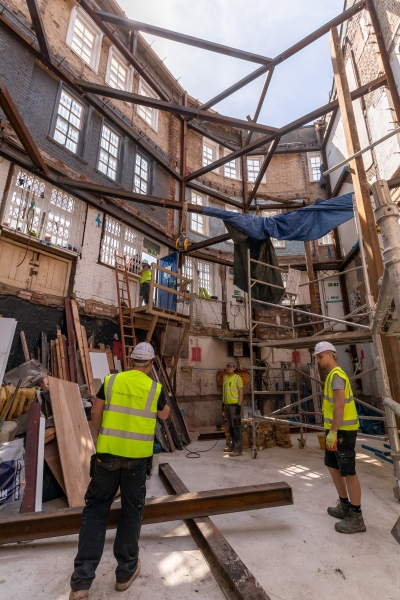Thames & Newcastle’s Commercial Director Stanley Leask discusses what makes a successful basement project and the benefits of in-house expertise.
As one of the most complex elements of construction, basement projects demand specialist skills. If not managed correctly, the work can create delays while compromising quality. To avoid these issues and give us a competitive edge, we made a strategic decision to set up our own in-house team in 2017.
Why in-house matters
Internal expertise means we can co-ordinate and manage the whole process from the design stage right through to the installation of a basement. This provides clients with more flexibility and efficiency on site, enabling any groundworks and superstructure construction to be delivered in tandem.
There are financial benefits too. As we don’t have to appoint specialist subcontractors, this lowers costs for our clients.
Our basement team members have been selected based on their specialist experience and qualifications, which has seen us become a Newton Specialist Basement Contractor (NSBC).
Newton is the UK’s leading independent supplier of structural waterproofing systems, associated pumping and drainage products. As an approved NSBC contractor, we must adhere to strict criteria and demonstrate quality workmanship, so clients can be assured we have the skills to design and install our own waterproofing systems.
Avoiding pitfalls
The complex nature of creating or refurbishing a basement goes hand in hand with risks. To prevent these, there are key steps to follow.
The first is to choose the right team. While that may sound obvious, there are common traps people fall into. For example, not all structural engineers have the correct knowledge and experience for basement projects. We have seen several projects designed using contiguous or secant piling when it is not practically possible to implement this as the machinery won’t fit on site or in the location it needs to be used.
Given the logistical challenges of this type of work, groundworkers must be highly experienced as well. Local roads, pedestrians, residents, parking restrictions and deliveries are just some of the factors which need to be carefully managed while undertaking basement construction. Selecting groundworkers with the proven skills and knowledge to manage these and minimise any potential disruption is essential.
Once the right team members have been selected, early engagement is also critical. From our perspective, the earlier we can get involved in the project the better. The structural design often overlaps with the waterproofing design, so can affect the waterproofing’s integrity once complete. Our input in the design process will ensure the right design strategy for both elements.
Obtaining a comprehensive ground condition report is another vital factor in the process. Soil types and water levels can vary widely, so it is important to understand this from the outset and not to rely on desktop information.
Building a specialist portfolio
Our journey in basement construction has seen us deliver diverse projects in recent years, including building a double-storey basement within a new multi-million-pound luxury home; constructing an additional basement under an existing lower ground floor on a terraced house; creating basements for six luxury homes within the same development; and building a new basement while retaining a property’s façade.
Our latest projects reflect a rise in demand for basements featuring swimming pools and spas, adding to the complexity of the work.
By keeping skills in-house, we have forged a reputation for carrying out this specialist work to the highest standards, minimising any potential risks and ensuring the best possible outcomes for our clients.
For further information about our in-house basement expertise, visit https://www.thames-newcastle.co.uk/basements/ or contact us to discuss your requirements: email [email protected] or call 020 8962 3320.

